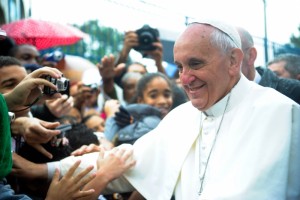Why Religion and Politics Must Collide at the UN Sustainable Development Summit
It would be difficult for the average Georgetown student not to know of Pope Francis’s descent upon the United States for the first time last week. While his meeting with President Obama and his address to Congress drew significant attention, perhaps more globally influential visit was his trip to New York, where he addressed the United Nations at their headquarters during the General Assembly on September 25. Francis’s address gave to the 193 member states as a kick-off to the Sustainable Development Summit occurred in conjunction with the General Assembly. Pope Francis announced his support for the Sustainable Development Goals and criticized nations for their historical thirst for power that has led to the misuse of natural resources and an increase in global inequality. He also discussed “the right to the environment,” maintaining that harming the environment is equivalent to harming humanity.
Undoubtedly, not every member state is affiliated with the Catholic faith; nevertheless, every nation bears some responsibility for global emissions and the current state of the environment. Three of the world’s ten biggest carbon emitters, according to the World Resources Institute, also happen to be three of the five countries with the largest percentage of Catholics: Brazil, Mexico, and the United States.
These nations hopefully paid close attention to Pope Francis on Friday, as they all play major roles in the climate change problem. With data presented in the latest Intergovernmental Panel on Climate Change report stating that rising temperatures in the 20th century are likely to be human-caused, one would hope that Brazil, Mexico, and the U.S. will be motivated to meet the Sustainable Development Goals.
While Pope Francis carries authority in most countries, he is particularly well-regarded in Brazil, Mexico, and the United States. Brazil is the largest Catholic nation in the world, with 65% of its population identifying as Roman Catholic, and Catholicism enshrined as the nation’s official religion. Similarly, 82% of Mexico’s population identifies as Catholic, with 47% of these individuals attending church services every week. Lastly, the United States’s Catholic population numbers 79.7 million as of 2014. All of these figures indicate that messages from the Catholic Church will be taken into serious consideration.
In terms of the greenhouse gas emissions of these three predominantly-Catholic nations, Brazil is marked by high rates of deforestation. Despite a three-fourths decrease from 2005 to 2010, the implementation of the Forest Code in 2012 essentially reversed that trend; in 2013, deforestation rates doubled in six months. The Forest Code decreased rainforest protections and also granted amnesty to those who have illegally burned and logged forests. This result is problematic not only because the Amazon is the most biodiverse ecosystem on the planet, but also because, after fossil fuel combustion, deforestation is the second-greatest source of greenhouse gas emissions. Moreover, Mexico uses fossil fuels to produce an overwhelming majority of its electricity for its 121.2 million citizens. The emissions of the second-largest greenhouse gas emitter, the United States, come from electricity, transportation, and industry production of goods and raw materials, according to the EPA.
The U.N. Sustainable Development Goals aim to change things like emissions rates. The 17 goals cover a majority of the problems associated with unsustainable global living and mimic the Millennium Development Goals created in 2000. Mexico and Brazil demonstrated significant progress in terms of meeting these since their implementation, and according to the Center for Global Development’s Millennium Progress Index, both countries tied for 4th place in global progress rankings.
Climate change has major impacts on poverty all over the world. 14.5% of the U.S. population lived in poverty according to 2014 data; 21.4% of Brazilians lived below the poverty line in 2009; and a whopping 52.3% of Mexico’s population lived in poverty in 2012. By pursuing climate change mitigation processes, not only will these nations’ emissions rates decrease, but their economies will also continue to grow in ethical ways.
The large Catholic populations of Brazil, Mexico, and the United States and previous successes with UN’s Millennium Development Goals provide no reason why they cannot support Pope Francis’s recommendations by making major progress on the Sustainable Development Goals and climate change mitigation as a whole. It is time for Catholics and carbon emitters alike to put a stop to the apocalyptic problem known as climate change. One can hope that flying the Holy See flag over the U.N. Headquarters symbolized a new beginning for Brazil, Mexico and the U.S. alike.

